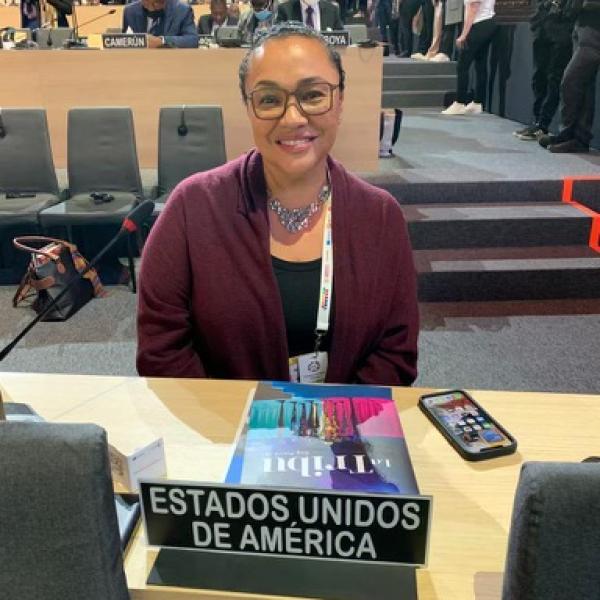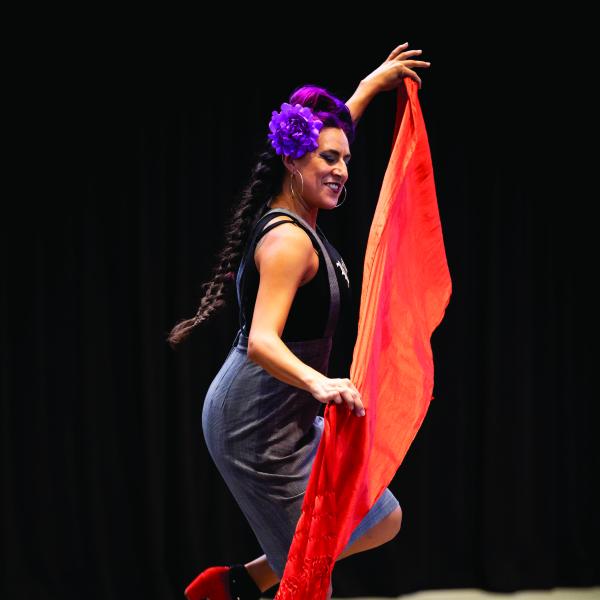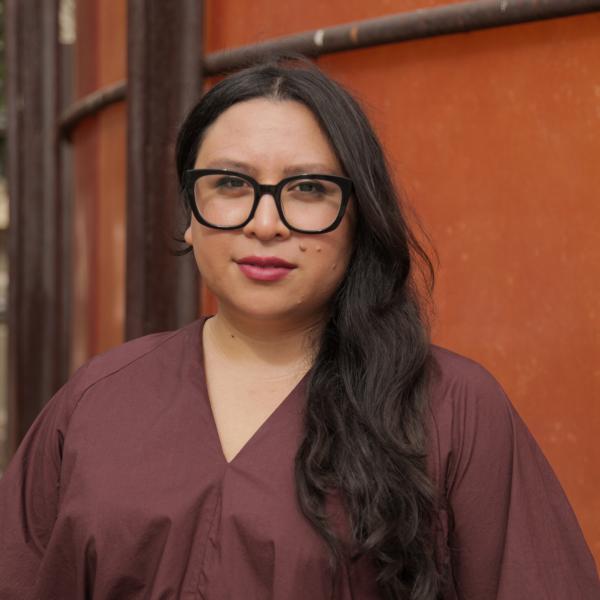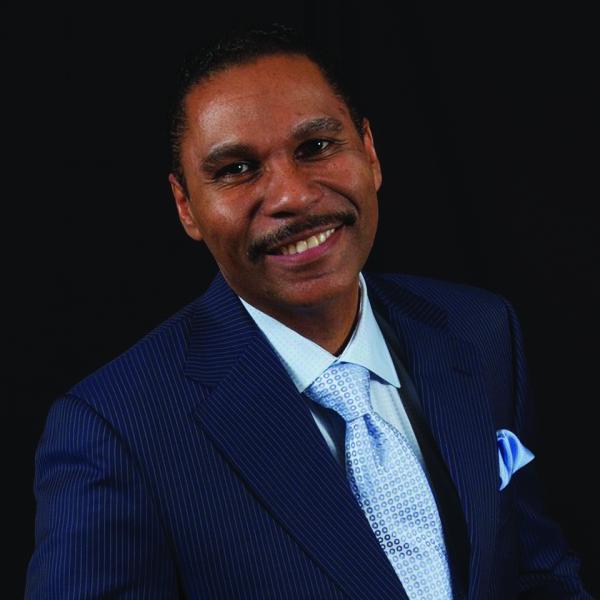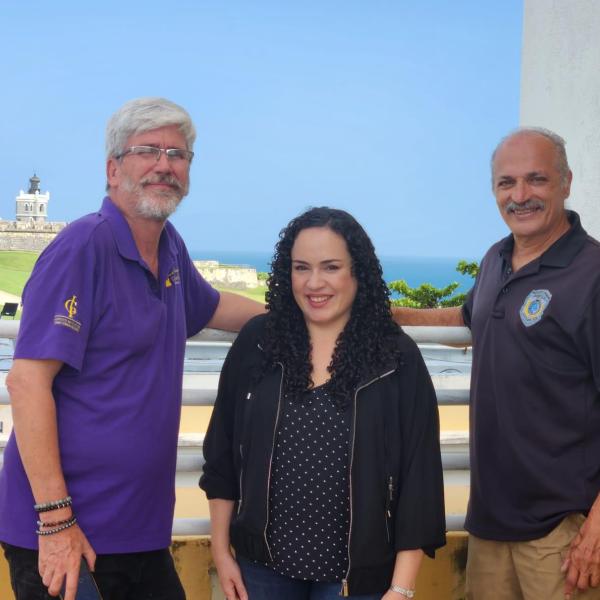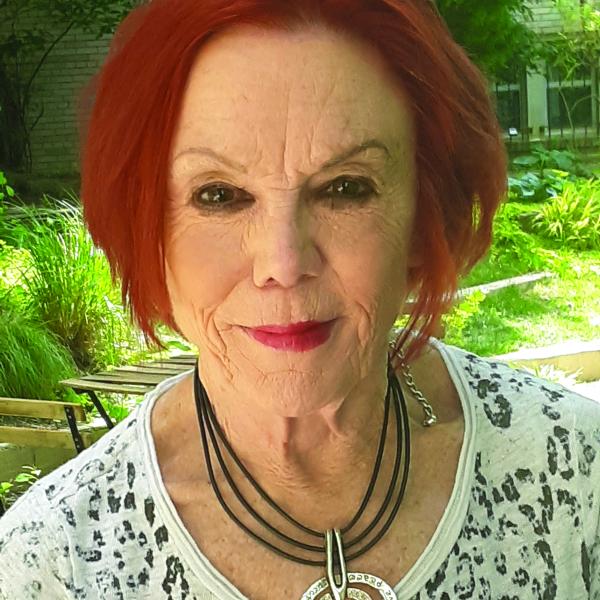Across Borders and Generations
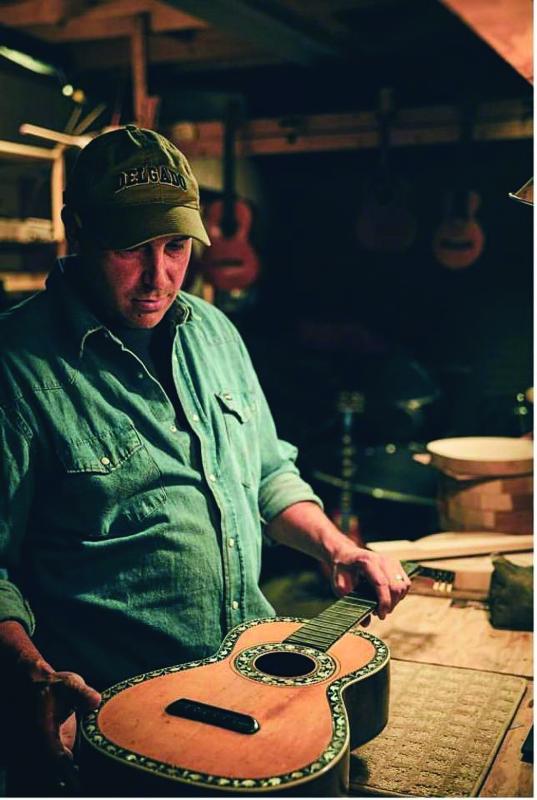
Luthier Manuel Delgado with one of his guitars. Photo courtesy of Delgado Guitars
Manuel Delgado comes from a long family tradition of hand-building stringed instruments, many related to use in Mexican musical styles. In 2005, he opened up his own shop in Nashville, Tennessee—Delgado Guitars—but the knowledge of three generations goes into the instruments he crafts. His grandfather and great-uncle opened a shop in Torreón, Mexico, in 1928, honing and perfecting their craft of building guitars and other instruments before moving to Juarez and eventually Los Angeles, where they opened Candelas Guitars in 1948. By then Delgado’s father was immersed in hand-crafting instruments, becoming a second-generation luthier working and eventually taking over the shop as his father and uncle aged, carrying on and expanding the family tradition that he would pass on to his son.
We talked with Delgado about carrying on the family tradition, opening his own shop in Nashville, the craft of guitar-making, and his mission to bring musical programs to schools in the community.
Music Credits: Excerpts of guitar music written and performed by Jorge Hernandez, used courtesy of the artist.
Jo Reed: From the National Endowment for the Arts, this is American Artscape online. I’m Josephine Reed. Manuel Delgado combines a multi-generational family legacy of hand-crafting string instruments with a deep and broad commitment to community activism.
Manuel Delgado may have begun the shop in 2005 but the knowledge of three generations goes into the instruments hand-crafted at Delgado Guitars in Nashville, Tennessee. Manuel’s grandfather and great-uncle Candelas began building guitars and other instruments—opening a shop in Torreón, Mexico in 1928, honing and perfecting their craft, moving to Juarez and eventually Los Angeles where they opened Candelas Guitars in 1948. By then Miguel’s father, also named Candelas was immersed in hand-crafting instruments becoming a second-generation luthier working and eventually taking over the shop as his father and uncle aged, carrying on and expanding the family tradition.
By the 1960s workmanship of the Delgado’s was so renowned that they were commissioned to build three guitars for Andres Segovia, considered to be the world’s greatest classical guitarist…just one of the many musicians commissioning instruments from the Delgado’s.
Manuel Delgado: I tell everybody it's very much the immigrant story where the patriarch of the family would leave and try to establish something and then send for the family. So my dad came to the U.S. when he was around like 13 or 14. And my mom is also born in Mexico and came to U.S. via Tucson, and they eventually met, and I'm the first generation born in the United States, born in Boyle Heights in East Los Angeles.
Jo Reed: Candelas taught his own sons Thomas and Manuel all that goes into building fine instruments. And Manuel remembers growing up in his fathers and grandfathers shop learning the many steps of making a guitar.
Manuel Delgado: I started playing guitar when I was five. So I was around the shop, and always around musical instruments, and always around music. But when I was seven, I started to really help with some repairs and minor things, putting a set of machine heads on a guitar, putting strings on, helping customers if they came in and they needed to buy a pick or set of strings or a string winder. But it was when I was about 11 and a half that I really wanted to take it more seriously and take it to the next level, and honestly beat my dad's record of when he built his first instrument, which was 14. And he and my grandfather helped me, and I built my first instrument when I was 12.
Jo Reed: But as much as he loved building instruments, Manuel especially valued the time he spent in the shop with his father and grandfather learning lessons that went far beyond hand-crafting guitars.
Manuel Delgado: You know, I'm very, very fortunate to have gotten to work with my father and my grandfather, and I have a lot of great memories. The strongest memory, I guess, would be just the opportunity of being in their presence, I just got to see them interacting with one another, interacting with the folks who worked with them, the way that I was brought in, and the care my grandfather had for me the care my dad had for me and, I mean, I miss them every single day of my life, but I'm surrounded by them every single day of my life, and I'm getting a little teary eyed talking about it right now, but that's a testimony to how much they meant to me because they've had such a huge impact on my life. So anything from the lessons they would teach me and little phrases or whatever it might be that I learned later as an adult that they were not just teaching me about making instruments, they were preparing me for life, and the two that I like to quote a lot is from my father. He would always say, "You have to start with the end in mind," and I use that in everything that I do, whether it's what kind of a father am I going to be, what kind of a husband am I going to be, what kind of an employer, what kind of a community activist, whatever, and of course, what kind of instrument am I going to build, I see the end result before I ever start with any action towards putting pieces together to build something or whatever. And with my grandfather, I loved it, he would always say, "Tómate tu tiempo, porque tenemos prisa," which means take your time, because we're in a hurry, and we don't have the time to do this over and over and over again, so take your time and do it right the first time.
Jo Reed: The idea of setting up a shop in Nashville had long been a dream of the family.
Manuel Delgado: So in 1993, my mother and father came to Nashville on a vacation, and they just fell in love with the city, and back then my dad thought about maybe we should open up a shop, but that was the same year that my dad was diagnosed with cancer, so we focused on his health and kind of forgot about that. Fast forward to 1999 when I met my future wife, now my wife of almost 22 years, and my wife is a singer and a songwriter, and she had come here with her folks like in '95 and always dreamed about maybe coming here and pursuing her passion as well.
Jo Reed: After their father’s death, Candelas Guitars continued on in Los Angeles, run by Thomas. In 2005, Manuel and his wife Julie made the difficult decision to leave their families and move to Nashville where Manual opened Delgado Guitars.
Manuel Delgado: With my wife's encouragement, and my mom's blessing, we made the move and I started all over again. I tell everyone, I went from East L.A. to East Nashville because I'm drawn to the east side tends to be where all the Bohemian artistic folks gather. And I'll say I really look at that now and I see the blessing that it was of even having to start over because I felt like in a very small way, because in no way did I make the sacrifices that my grandfather and my great-uncle did, but it put me a little bit in touch with what it was to have to start over, start something, even though I had this great, rich history, and one of the things that I've always loved of Nashville was it didn't kind of go, "Oh, you're Delgado, here, let's open all these doors for you." It was the opposite. It was like, "Oh, great, you have this great family history. Okay, what can you do? " I had to prove to myself and to the city that I was worthy of the respect or to be trusted with people's musical instruments or whatever it might be. So I love that about this city.
Jo Reed: While Manuel’s business is called Delgado Guitars—that barely touches the surface of the many instruments he builds.
Manuel Delgado: So one of the many things that I love about what I do is that we don't just do one thing. I always tell people if it's got strings, and you can carry it in, we can fix it, so that rules out pianos. So <laughs>, but we hand make over 45 different types of string instruments, and what people don't understand is, if I said steel string guitar, within the steel string guitar, there's dreadnought, there's O.M., there's southwest, there's jumbo, there's parlor, there's all these different body styles. Those are not part of the 45, those are just a subgroup of the 45, if you will. So aside from those we make violas, the Mexican violas used in mariachi, we make the big guitarron, the bass used in mariachi, we make the mariachi harp, we make the guittara de golpe used mariachi, we make bajo quintos, jaranas, and bajo jarochos used from Veracruz, we make the Cuban tres, we make the Puerto Rican cuatro, we make the ukulele from Hawaii, anything from the soprano to the concert, tenor, baritone. We make banjos, square neck resophonics—people call them dobros, mandolins, tamburitzas, oh, gosh, all kinds of different stuff.
Jo Reed: There is a Delgado style of making instruments that Manuel learned from his father and grandfather. These are hand-crafted—not only are few power tools involved, Manuel often makes the tool he needs to make the instruments.
Manuel Delgado: I'm what we would title an old-world luthier, and I tell people that's not just because I'm old, it's because we're using the old world techniques in the way that we build . And also our connection with the instrument is very important, so the fact that we carve the necks by hand and chisel out the rosettes by hand, we're deeply invested in that instrument. We treat every instrument as an individual because that's how I view every person that I have the opportunity to come across. And with the instruments, these are living, breathing things that we're taking a piece of wood that was once growing in a forest, and we're going to transform this into an instrument. And we don't use the McDonald's business model that is used by most mass-produced types of products, where you find a low-skilled labor person that can duplicate a process over and over again and take all the guesswork out of it. We try to get the most potential out of anything that we're working with and getting everything out of it, and realizing that every component that is a part of that instrument matters and then if you know that you're going to take a different kind of care and approach towards it.
Jo Reed: And it’s a craft that involves science as well as artistry.
Manuel Delgado: I like to tell folks if I gave you the best ingredients and the most organic ingredients and asked you to put a meal together, if you don't combine everything correctly, you can still ruin that meal. So it's not just about having the right materials. It's having the skill set to know when to bring something to a boil and take it down to a simmer, what spices to add, and everything. There's time involved, the when that happens and how long it happens, and that's how it is with an instrument as well. It's not only having a respect for the material and the wood and knowing what it's provided while it was growing, and what it's going to provide in the future, and seeing that, you know, I have instruments that when my grandfather and my great-uncle, my dad are no longer with me, but their instruments are still out in the world, and they're still providing joy or helping someone through sadness, whatever it might be. But there's still mathematics, there's science, there's angles, there's knowing how is this person going to play this instrument? How are they going to attack it? What kind of a response are they're looking for? And that tells me the distance that the strings need to travel, the intonation needs to be adjusted this way to make sure that the tuning is proper. So ,yeah, there's a lot that has to be done correctly, none of it is by accident.
Jo Reed: Manuel wants to know about the people he’s making a guitar for. When a customer comes into Delgado Guitars for a handcrafted instrument, part of the process is an in-depth interview with Manuel.
Manuel Delgado: We've been told that we should get a couch where people can lay down and have like a therapeutic session, because I really like to get to know the person. Our tagline for Delgado guitars is does your guitar have a story? And that's because I believe everybody has a story that's worth telling. And so when we sit with them, I want to know about what their life is, who are the people that are in their lives that matter to them. The question I love to ask people is, "When you're playing, where are you? " And I don't mean like physically like, “Oh, I'm sitting in a studio,”—no, art transforms, or transcends—it takes you somewhere where you're not necessarily where you physically are. If it's great art, and if it's challenging art, it may even be an uncomfortable place, but that's what art should do, and good art does do. So if somebody's playing a guitar, maybe they're imagining they're somewhere they've never been, or maybe they're back to a place that they loved. So by knowing all of these things, it helps me to not only have almost like an understanding and a blessing that I can be thinking about over the instrument as I'm building it for that person, but I also transform those ideas into different types of inlays and colors. There's significance and meaning in it, and as an artist, what are we always looking for but some type of inspiration. So that's what we want to do, we want to make sure that we're giving somebody a gift that has some meaning to them.
Jo Reed: And the client list for these hand-crafted instruments is like a who’s who of great musicians.
Manuel Delgado: Well, if we go back through all generations, starting with my grandfather and my great-uncle, the great Andres Segovia, Celedonio Romero which is the father of Pepe Romero and Angel Romero, and people don't realize my grandfather and Celedonio were actually compadres, which means my dad baptized Pepe Romero, so he was Pepe Romero's godfather. Theodore Bikel, Arlo Guthrie, The Kingston Trio, Jose Feliciano, Los Lobos. We've done stuff for Eddie Murphy, for David Lee Roth. I do work with Los Lobos still to this day, with the Old Crow Medicine Show, Buddy Guy, oh gosh, Jackson Browne. And then of course we have the amazing mariachi ensembles that we have the honor of working with, Mariachi Cobre. Mariachi Norte Caticlan. We work with a lot of conjunto or norteno groups: Los Dedos del Norte, Banda la Carar Roja, Los Extemenoadores , a lot of the trio ensemble or trio groups. So, yeah, a little bit of everything.
Jo Reed: Hand-crafting an instrument takes talent, precision, and time….I was curious how long would it take to build a guitar.
Manuel Delgado: If we're talking about an acoustic steel string or a concert classical guitar, the average amount of actual labor hours that go into that instrument are somewhere between 200 to 240 hours.
Jo Reed: And how many instruments does Delgado Guitars create in one year.
Manuel Delgado: If we were just building instruments, we could probably produce somewhere in the 40 to 50 range, but because we're not just doing that and because quite honestly, because we do a lot of work outside of the building of instruments with the community and with different things, right now our average is somewhere in the 10 to 18 range.
Jo Reed: And now we get down to it. If all Manuel Delgado did was his work as a luthier, he would be extraordinary enough. But Manuel is also deeply involved with community engagement and is a tireless advocate for the arts in general and arts education in particular.
Manuel Delgado: I always say I've always been a fan of the underdog, and if you're an artist you're an underdog because <laughs> you're choosing a life that's not necessarily like the easiest route to go, you know what I mean? So it's a constant battle, and that's how I look at it with all arts programs, and with the music programs that we have the opportunity to work with around the United States, and these music directors and these music educators who, oh my gosh, they are the ones who work tirelessly, and they're the ones who give so much, and they're fighting a system that wants to eliminate their program, doesn't see the value of what they're doing, and the irony of it all is there's greater value in what they're providing sometimes than what other classes may be doing. And to explain that a little bit further, just looking at the science of how the brain responds to being involved in the arts and specifically in music programs, and how that is the only activity that stimulates the entire brain, and it prepares it to receive information. So having that music class is going to allow them to do better in social studies, in English literature, in mathematics, whatever it might be, because they are involved in the arts, whether it's dancing, or painting, or whatever it might be. So for me, I really view it as a great gift and honor that these women and men around the United States who are working in this field have invited me to be a small part of helping them in whatever way that I can, and they're like my heroes,
Jo Reed: Manuel works closely with educators in many ways, including creating a line of affordable quality musical instruments for students in music programs.
Manuel Delgado: So the business is Delgado Guitars, but I always say we have all these other brands underneath Delgado Guitars, and La Tradicion Music is a brand that I created, La Tradicion, the tradition, where originally it was created because I was frustrated with American companies making these subpar Latin instruments, and kind of with the attitude of like, eh, they'll buy them because that's all that's available, and not taking the time to understand the history or the culture and doing it correctly. So one of the things that we do is we go into the schools, and we've gotten a niche through all the different mariachi programs that are growing in the school programs around the U.S., but we work with all disciplines of music. But we'll go in, and I say I either help start a program, help grow a program, or help an established program with whatever their needs are. I want to know who I'm working with, and I want to know their story, and so I know the best way that I can be of support to them. And sometimes that's connecting them with somebody else. I always <laughs> tell people it's kind of like that Miracle on 34th mindset where Santa Claus would say, "Hey, you should go to the other store because they have a better deal." And that's kind of how we do it, if we're giving the folks who are trusting us the best advice, then they're always going to trust us to come back. So just being able to be present, to provide the information that's needed to start that program and grow it, and then if they're needing instruments and stuff like that then we hope that they'll think of us and they'll order the instruments from us. But honestly, if the program gets started, and they get their supplies from somebody else. I still see it as a win because we're helping to grow the music programs around the U.S., and If the community in whole wins, then we're winning.
Jo Reed: Manuel Delgado gets personally involved with the students as well—creating and running a mariachi afterschool program for at-risk kids in Nashville.
Manuel Delgado: So about 12, 13 years ago I was honored to be asked on a board that was just forming called the Music Makes Us program, and we wanted to create all kinds of different musical genres and disciplines in our schools and provide the best school programs we could for all of Davidson County. So it meant hip hop, and world drumming, and songwriting, and lead guitar, and not taking away any of the choir or orchestra programs because some kids don't want to be in that, and one of the things that I was fortunate was to start a mariachi ensemble here as well in one of our middle schools and high schools. this is one of the things that I try to educate our fine arts directors and superintendents, I tell them look at the demographics of your city, or at least your school zone, and if you were to open up a restaurant and want to have success, what kind of a restaurant would you open? And I do that because they'll see that a huge portion of their population is Latin, Hispanic Latino. And so I said," Well, why wouldn't you want to offer a genre of music that also speaks to them?"
Jo Reed: While Nashville might be pegged as a town known for country music, Mariachi is very popular there—as it is throughout the United States. Which led Delgado Guitars to present the first Music City Mariachi Festival. Manuel explains how it came together.
Manuel Delgado: I was approached by a couple of ladies here in town that were wanting to do this, and there's a 54 piece mariachi ensemble that comes from Guadalajara, Mexico, and Mexico en el Corazon, and they travel around the U.S., and we were wanting to do something here, and we literally had like eight weeks to do this, and they were saying, "I don't think we can do this. Somebody told us to call you," and I said, "We can absolutely do this. We're going to make this happen.” So we did, we put it together, 2018 was I think, the first year we did it, we did it again in 2019. It got shut down because of the pandemic during 2020, 2021, and then this year they brought it back. I wasn't included in it this year, they moved forward with it, and I think that's great. It's done at our Symphony Center where, you know, we wanted it to be a place where people would come in and have like a reverence and respect rather than think of it as like barroom music, we wanted that kind of setting, and I'm honored, I'm on the board at the symphony, so I'm glad to see that they're continuing it, and it's a great event for the community, and I look forward to having it happen year after year after year. And now I've moved on and I'm working on creating a mariachi conference that's going to happen here in Nashville, so that's what my work's focused on right now for next year.
Jo Reed: Ever community-minded, next door to Delgado’s Guitars, Manuel and his wife Julie created a gathering place and performance venue they call Music Makers Stage.
Manuel Delgado: The main focus there was to create a space in our neighborhood and for our community where, whether it be musicians can come and perform, and we could have families come and attend those events, or sometimes we'll do free movies for our community for some of the kids. There's a strings program that works with students here that we let them use the space for free, and they do teach orchestra instruments, well, mainly the violin, viola, cello, and double bass, and they use our space, and they're able to teach there, so it was basically a community space. And now we have live shows that happen every other Friday night. We really viewed it as an opportunity to do something in the community.
Jo Reed: And Manuel is passing down the tradition of instrument making to both his daughters. And he doesn’t mind bragging about his eldest daughter’s accomplishments.
Manuel Delgado: Ava beat my record, she just destroyed my record, which I'm so proud of. She finished her first instrument two weeks after her 10th birthday. And she's 14 now.
Jo Reed: In fact, Ava officially served as Manuel’s apprentice through the Tennessee Arts Commission Folk Life Apprenticeship. The grant provided some financial resources since Manuel’s work with Ava took time away from the business, but for Manuel, it’s real value was something else.
Manuel Delgado: What I really appreciated about it was it drew a seriousness and a sense of not urgency but, okay, if you're going to do this we need to put a plan together, and they ask you to do that, answer these questions, which I had her answer, put a timeline together, when are we going to be working on this? When is it going to be completed? What are some of the things that we're going to achieve, some of the goals through this? And when you do that now it helps them, their minds, lay out a plan moving forward and because she knew the commitment she had signed up for it was not a challenge or a battle to make this thing happen. And I have hours and hours and hours of video of her because I never wanted anybody to go, "Oh, I bet you Manuel built it, and they just had her pose for these photos," you know? I was like, "Un-unh, she did it, she did it all," and I'm very, very proud of her for many reasons, but I'm proud of her for completing that.
Jo Reed: Being a luthier, hand-crafting instruments, this a tradition that Manuel Delgado proudly inherited, deeply embraces, and carefully teaches his daughters, now the fourth generation to learn this craft. But Manuel wants above all for the girls understand the legacy of the family.
Manuel Delgado: I have the strongest connection with my father and my grandfather, you know, whether it's building an instrument or just interacting with the community. And it's not as important for me that the girls continue the business. I want them to do whatever brings them joy, but what is very important for me is that they understand the importance of creating something. There's a whole world out there where there's people who've made a conscious decision to take a more difficult path in life, but they've done it because they are so passionate about their art and their craft that the idea of them not doing it would just almost kill them, if you will, emotionally or spiritually. So I want them to have that understanding and understand the struggles that came to give them the opportunities that they have now, and I'm not talking about me, I'm talking about my grandfather, my dad, and my mom, the things that they've given up to give us the life that I have so that we, my wife and I, can give the girls the life that they have now.
Jo Reed: That was Manuel Delgado—a third generation luthier and community activist—you can find out more about him and his work at Delgado Guitars.com
For American Artscape online, I’m Josephine Reed. Thanks for listening.


